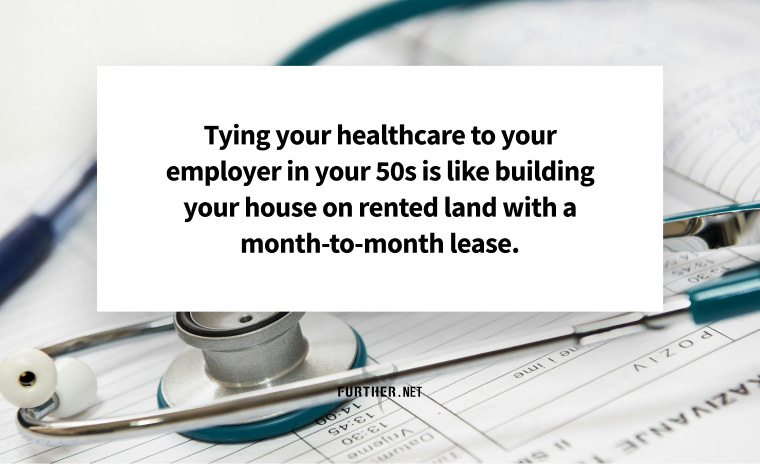How to Escape Your Health Insurance Handcuffs
Plus: Costa Rica's expat havens and chilling in New Zealand
Welcome to this week’s issue of Further, a newsletter for people in their 50s and 60s looking for a more satisfying alternative to the mythical “golden years” retirement.
If you’re here and haven’t yet subscribed, join 19,000+ people looking to live their best life at midlife by grabbing our free resource: The Further Guide to Unretirement Planning.
It’s not a news flash to say that healthcare in the United States is a mess.
While healthcare costs are of particular concern to those of us over age 50, there’s also an insidious aspect to it that negatively impacts us more than others.
The fact that health insurance is often tied to employment in the U.S. keeps people trapped in jobs that may not serve their best interests. The alternative of gaining access to quality coverage on your own is outrageously expensive.
And yet, there’s nothing stopping your employer from summarily dismissing you and your health benefits at the drop of a hat, compounding a disastrous financial outcome if unemployment coincides with a major health concern.
Among all the reasons to relocate to sunnier shores as an expat — including overall lower cost of living, higher quality of life, and a more stable political environment — healthcare occupies its own special category. This phenomenon is sometimes called "medical migration" or "healthcare emigration."
And it’s not just for lower costs. Often the care provided abroad meets or exceeds what you would get in the U.S. at a fraction of the expense, even without insurance coverage.
But somehow people still believe in American Exceptionalism when it comes to the quality of healthcare. It’s so expensive because it’s the best, right?
Unfortunately, no.
According to The Commonwealth Fund's international healthcare system comparisons, the U.S. continues to be in a class by itself in the underperformance of its health care sector. In a comparison of health system performance in 10 countries, The Fund found:
While the other nine countries differ in the details of their systems and in their performance on domains, unlike the U.S., they all have found a way to meet their residents’ most basic health care needs, including universal coverage.
Admittedly, the U.S. healthcare system does offer excellent advanced and specialized care, but it's significantly lacking when it comes to the basic care most people need relative to its high costs.
In fact, the U.S. consistently ranks lower than many developed nations in overall healthcare system performance despite spending significantly more per capita.
Here are the primary failings of the U.S. healthcare system compared with other countries (beyond keeping you tied to a job you hate):
High Healthcare Costs: The U.S. has significantly higher healthcare costs than most developed nations. Even with insurance, many Americans face substantial out-of-pocket expenses, deductibles, and co-pays.
Medical Debt: Medical bills are a leading cause of personal bankruptcy in the United States. A serious illness or accident can lead to financial ruin even for middle-class Americans with insurance.
Prescription Medication Prices: Many prescription medications cost several times more in the U.S. than they do in other countries.
Retirement Planning: Retirees often discover their Medicare coverage has significant gaps, leading some to seek countries where their retirement savings will stretch further for healthcare needs.
The good news? Those who relocate abroad often report significant savings.
For example, a procedure that costs $100,000 in the U.S. is likely to be available for $15,000 - $25,000 in Mexico or Costa Rica, often with comparably qualified doctors who trained in the States.
Many find that paying out-of-pocket for healthcare in many countries is still less expensive than maintaining insurance and covering co-pays in the U.S.
Because of this, Mexico, Portugal, Spain, Costa Rica, Panama, and Thailand have become popular destinations for American healthcare migrants. These countries typically offer:
Universal or affordable healthcare systems
Lower overall cost of living
Welcoming options for legal residency
Healthcare systems that perform comparably to or better than that of the U.S.
Prescription medications at a fraction of U.S. prices
Telling yourself that keeping your job and staying put is the more secure option amounts to an illusion. Tying your healthcare to your employer in your 50s is like building your house on rented land with a month-to-month lease.
You invest everything in a structure you don't control, living with the constant anxiety that the landowner could evict you without warning, leaving you not just homeless but also responsible for the full cost of rebuilding elsewhere.
While some desperately cling to mediocre jobs for health benefits, forward-thinking Gen Xers are building location-independent businesses with access to better healthcare for less.
The truly risky career move isn't starting your own business. It's trusting your health and financial security to a single American employer.
Keep going-
P.S. New to Further? Join us here.
And the Healthcare Winner is...
Which country has the best healthcare for expats and nomads? A recent analysis reveals a clear winner, and this is just one of many key aspects that make this country one of the most attractive destinations in the world.
+ This Coastal European Gem Has the Best Health Care for Digital Nomads and American Expats
Top Costa Rican Towns for Expats
A couple of week ago I told you to take a look at the Cartago Province to the southeast of San José as an up-and-coming area among expats in Costa Rica. But if you're looking for a little less of the pioneer experience, the established expat havens of Escazú, Santa Ana, Grecia, Alajuela, and Atenas are worthy of a serious look.
+ The Central Valley of Costa Rica: An Expat Oasis in San José and its Suburbs
Live Like a Kiwi
Back in 2019, my family and I did the “Down Under” 6-month stint, which means 90 days in Australia before hopping over to New Zealand for another 90 days on the standard tourist visa. While we loved our time in Australia, New Zealand was next level in terms of natural beauty, and I find myself wanting to go back for an extended stay.
Now thanks to New Zealand's new Digital Nomad Visa program, I can... and so can you.
+ New Zealand Opens Digital Nomad Doors Without Income Barriers
further: flashback
🎶 Peter Gabriel - Sledgehammer, So, 1986 🎶
The remarkable thing about Peter Gabriel's song Sledgehammer is the video. An innovative mix of Claymation, pixilation, and stop motion animation resulted in a record nine MTV Video Music Awards and Best British Video at the 1987 Brit Awards. According to Time magazine, it's the most played song ever on MTV, and is widely regarded as one of the greatest music videos of all time. (YouTube)
further: sharing
Enjoy this issue? Please forward this email to friends or share by clicking below:
Thank you for sharing Further!




Very helpful! I really like Costa Rica and Mexico but my heart is in France.
Thanks for the article and your Substack. 55 years old, let go of a corporate job at the start of the year, working on my location independent business now while paying COBRA for health insurance. Navigating this with Crohn's Disease may be an extra challenge, but one that I'm ready to take on.